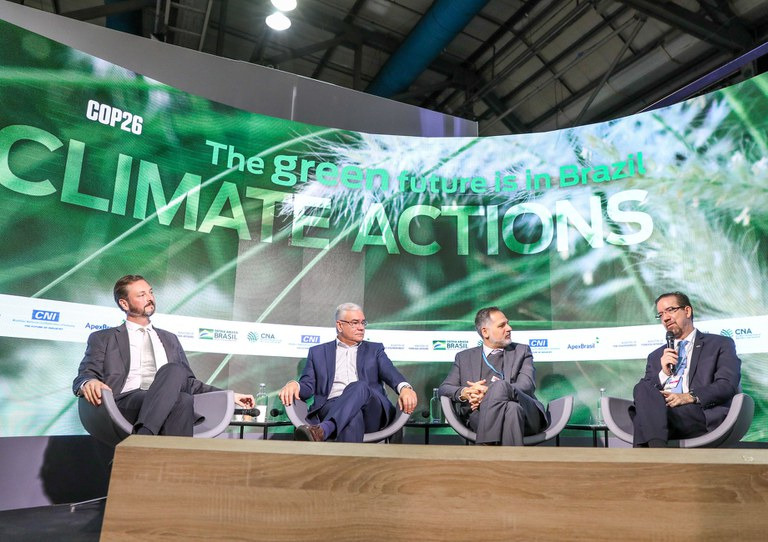Embrapa offers solutions for sustainable agriculture at COP26
Embrapa offers solutions for sustainable agriculture at COP26
In the meeting of world leaderships to discuss the future of the planet, the 26th UN Climate Change Conference (COP26), which is taking place in Glasgow, Scotland, Brazil's agricultural science disseminated potential and solutions for sustainable production and to minimize the impact of climate change. One of the main attractions was Embrapa's president Celso Moretti's presentation on soil organic carbon maps, with emphasis on the example of biological nitrogen fixation, both of which were developed by Embrapa.
Embrapa participated in a special panel on sustainable cattle farming with topics like Integrated Crop-Livestock-Forestry Systems (ICLFS), low carbon agriculture, carbon neutral beef, and the development of technologies for carbon neutral milk and low carbon leather and calves. The event also had the participation of the Deputy Secretary of Climate and International Affairs of the Ministry of the Environment, Marcelo Freire, and of the CEO of JBS, Gilberto Tomazoni.
Moretti also mediated the panel coordinated by BRF, a Brazilian multinational company and one of the biggest global food companies, on sustainability of the swines and poultry production chain in Brazil. BRF's global vice-president of Institucional Relations, Reputation and Sustainability, Grazielle Parenti, talked about ESG (environmental, social and governance) practices and reducing the production of greenhouse gases.
Several media outlets sought Embrapa to discuss the potential use of its technologies in the scope of the Brazilian government's adhesion to COP treaties. Moreover, Moretti was present in meeting to debate flobal agricultural public policy, with participation of representatives from Bayer.
Organic carbon
In the morning of day 2, Celso Moretti participated in the panel “Organic Soil Carbon - Opportunities and Challenges”, which highlighted Embrapa Soils' research that resulted in the recent launch of the maps of Brazilian soils' organic carbon. “Brazil ranks first among the 15 countries that have potential to stock carbon on a global level. Investing in soil studies is fundamental for the decarbonization of agriculture”, he commented.
The panel included the participation of the Deputy Secretary of Climate and International Affairs of the Ministry of the Environment, Marcelo Freire; the Secretary of Innovation, Agricultural Development and Irrigation of the Ministry of Agriculture, Livestock and Food Supply (Mapa), Fernando Camargo, and the Climate Connection associate Eduardo Brito Bastos.
Watch the video from Embrapa's president at COP26:
Brazilian experience for the south of Asia
“It was an important opportunity to demonstrate that it is possible, through science, technology and innovation, to minimize the negative effects of climate change”, said Moretti. “Sacep's member countries are concerned with the impacts of nitrous oxide and its potential to change the climate, which is 300 times higher than carbon dioxide. Hence the interest in learning about what has been done in the country in the last five decades”, he stated. In the panel "NDC update and Nitrogen-Climate opportunities: from South Asia to the world", the president talked about the biological nitrogen fixation technology and the annual savings of R$ 28 billion. “While we were saving that, we prevented the emission of 100 million tons of CO2 equivalent into the atmosphere”, he explained. Moretti also spoke about investments in Brazilian agricultural science, the dissemination of research results in the entire territory and the importance of agriculture for the Gross Domestic Product (GDP), which corresponds to 26.3%. “And all of that is based on guidelines with a focus on sustainability, with productivity and competitiveness”, he explained. “We are certain that agriculture today is part of the solution and not of the problems that cause climate change”, he said. Besides Celso Moretti, the Embrapa delegation included the researcher Gustavo Mozzer and the analyst Adriana Bueno, both from the Secretariat of Intelligence and Strategic Affairs (Sire). Mozzer has participated as Brazilian representative in the negotiations of the Koronivia Joint Work on Agriculture, and followed the GST discussions supporting the Brazilian Ministryof Agriculture's delegation in technical issues related to the negotiation process. Adriana Bueno has attended the schedule related to transparency and loss and damage. In Transparency, the discussion in on tables and formats to report national greenhouse gas inventories and Nationally Determined Contributions (NDCs) from 2024 on, when the Enhanced Transparency Framework (ETF) of the Paris Agreement comes into force. The other theme regards funding for developing countries for losses and damages due to the adverse effects of climate change, operationalizing the Santiago Network (SNLD), and reports of the Executive Committee of the Mechanism of Warsaw for Losses and Damages. |
Agenda in Europe
Moretti's schedule in Europe started last week. Between October 27 and 29, he was in the headquarters of Food Nation, a public-private partnership by the Danish government that promotes agrobusiness, in meetings about cooperation opportunities for the sector in both countries. The agenda in the country also included a visit to the Technical University of Denmark (DTU Food), whose focus is research on food production, and a meeting with the congressman Henning Jensen and the vice-minister of the Ministry of Foods, Tejs Binderup.
Watch Moretti's video in Denmark:
After COP26, on the 12th, the president of Embrapa will give a lecture for a seminar in Lisbon, Portugal, on sustainable agribusiness in Brazil, promoted by the Senate's Commission of Foreign Affairs and National Defense (CRE).
Kátia Marsicano (MTb DF 3645)
Secretariat of Intelligence and Strategic Affairs (Sire)
Press inquiries
imprensa@embrapa.br
Phone number: +55 61 3448 1861
Translation: Mariana Medeiros (13044/DF)
General Secretariat
Further information on the topic
Citizen Attention Service (SAC)
www.embrapa.br/contact-us/sac/


 Another participation of the president was in the morning of day 3, in one of the most important panels of COP26's side schedule of events, about solutions to reduce greenhouse gas emissions in Brazil. The presentation, coordinated by the South Asia Cooperative Environment Programme (
Another participation of the president was in the morning of day 3, in one of the most important panels of COP26's side schedule of events, about solutions to reduce greenhouse gas emissions in Brazil. The presentation, coordinated by the South Asia Cooperative Environment Programme (